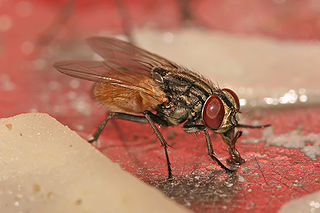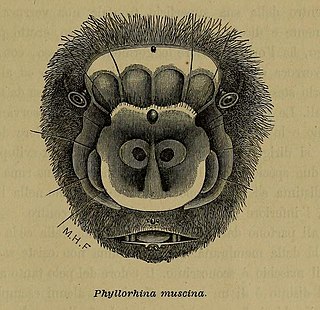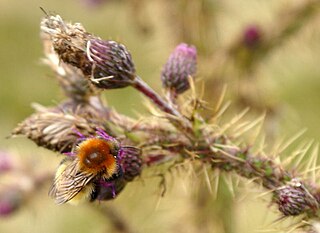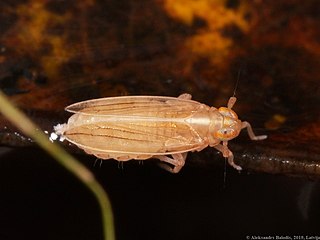
Convolvulaceae, known commonly as the bindweed or morning glory family, is a family of about 60 genera and more than 1,650 species of mostly herbaceous vines, but also trees, shrubs and herbs, and also including the sweet potato and a few other food tubers.

Moses Harris was an English entomologist and engraver.

André Jean Baptiste Robineau-Desvoidy was a French physician and entomologist specialising in the study of Diptera (flies) and to some extent of the Coleoptera (beetles).

Muscidae are a family of flies found in the superfamily Muscoidea.

The Fly River roundleaf bat is a species of bat in the family Hipposideridae. It is found in West Papua, Indonesia and Papua New Guinea.

Kerivoula is a genus of vesper bats in the subfamily Kerivoulinae.

Bombus pascuorum, the common carder bee, is a species of bumblebee present in most of Europe in a wide variety of habitats such as meadows, pastures, waste ground, ditches and embankments, roads, and field margins, as well as gardens and parks in urban areas and forests and forest edges. It is similar in appearance to Bombus muscorum, and is replacing the species in Northern Britain.

Muscina is a genus of flies that belongs to the family Muscidae, currently consisting of 27 species. They are worldwide in distribution and are frequently found in livestock facilities and outside restrooms. The most common species are M. stabulans, M. levida, and M. prolapsa. Muscina flies commonly breed in manure and defecate on food, which has been linked to the spread of some disease and illnesses. The occurrence of Muscina larvae on dead bodies has led to their regular use in forensic investigations, as they may be used to estimate the time of death. Research have shown the prevalence of certain species of Muscina flies as vectors of diseases such as poliomyelitis.
M. japonica may refer to:

Bombus muscorum, commonly known as the large carder bee or moss carder bee, is a species of bumblebee in the family Apidae. The species is found throughout Eurasia in fragmented populations, but is most commonly found in the British Isles. B. muscorum is a eusocial insect. The queen is monandrous, mating with only one male after leaving a mature nest to found its own. Males mate territorially and the species is susceptible to inbreeding and bottlenecks. The species builds its nests on or just under the ground in open grassland and forages very close to the nest. In recent years, populations have significantly declined due to loss of natural habitat. B. muscorum is currently listed as vulnerable in Europe by the European Red List of Bees.

Mecinus pascuorum is a species of true weevil in the family of beetles known as Curculionidae.

Kelisia is a genus of delphacid planthoppers in the family Delphacidae. There are more than 50 described species in Kelisia.
Milesia scutellata is a species of syrphid fly in the family Syrphidae.
Mixogaster breviventris is a species of syrphid fly in the family Syrphidae.
Chrysotoxum chinook is a species of syrphid fly in the family Syrphidae.
Aradus funestus is a species of flat bug in the family Aradidae. It is found in North America.
Sphecomyia nasica is a species of syrphid fly in the family Syrphidae.
Spilomyia liturata is a species of syrphid fly in the family Syrphidae.
Muscina dorsilinea is a species of house flies, etc. in the family Muscidae.
Animal Ethics is a nonprofit organization formed to promote discussion and debate around issues in animal ethics and to provide information and resources for animal advocates. They also do outreach work in several countries on the issue of speciesism. Their aim is to create a world where moral consideration is extended to all sentient beings. The organization's website covers topics such as speciesism, sentience, veganism and wild animal suffering and has content translated into several languages.










